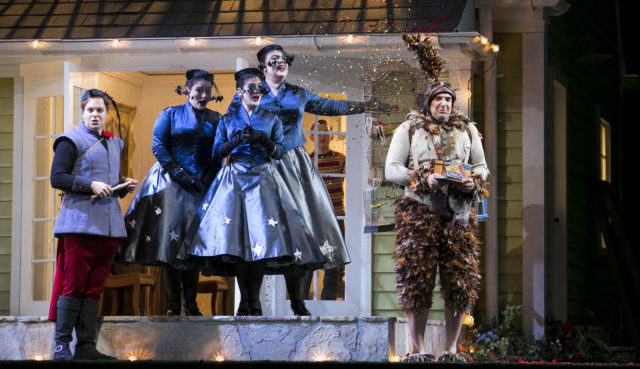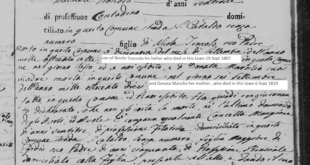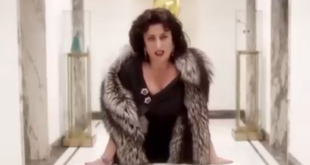
Mozart’s “The Magic Flute” live, produced by one of the world’s foremost opera companies1 It doesn’t get much better than that even though it’s a bone-chilling 4 degrees above zero outside the toasty Civic Opera House. Having seen this opera so many times, its characters are like old friends to me, so I expected that the Lyric singers would at least do justice to their roles. I wasn’t disappointed.
There are a number of things to say about the “Flute’s” many singers, but before we get into that I would just like to once again voice my supreme admiration for the fine Lyric orchestra, ably led by Scottish conductor Rory Macdonald. The tempos were slightly peppy for my taste, but overall there was a true Mozartian precision that pleased greatly and a warmth from the vibrating strings and wood and reeds and percussion that made one totally forget how cold it was outside. Then of, course, you had the fine flute and piccolo playing and the keyboard bells that provided the “Magic.”
It is customary for three boy sopranos to sing the roles of the Three Child Spirits. The last time “The Magic Flute” was performed at Lyric, apparently they couldn’t find three boy sopranos up to the task, so they used one girl soprano and two boys. In the most recent production, however, the three were all boys — Casey Lyons, Parker Scribner and Asher Alcantara. They measured up just fine, singing some of Mozart’s most beautiful music, and even acting well in the two suicide-prevention scenes. (Actually, the Three “Child Spirits” were never intended to be all boys, Schikaneder’s daughter Anna being one in the première.)
One of the most remarkable musical parts of “The Magic Flute” is in Act 2, when Tamino encounters the Two Armed Men. Here Mozart pays tribute to J. S. Bach. With its “cantis firmis” Baroque-style running bass line and obbligato vocals, this music could easily come from a Bach cantata. Its effect is to transport the listener out of the present and into the misty past. Tenor Jesse Donner and bass Patrick Guetti sang the all-too-brief passage with power and precision.
The production’s Monastatos, tenor Rodell Rosel (who’s supposed to be black, but is not, for some reason) is a better actor than a singer. Even in his one aria, “Alles fühlt der Liebe Freuden,” he emoted spoken rather than sung words.
Another who is very good at acting, but also sings extremely well, was Lyric’s Papagena, soprano Diana Newman. She was funny in teasing Papageno while disguised as an old woman, which one would expect. But she was surprisingly very strong musically in their “Pa-, Pa-, Pa-” duet.
The Three Ladies were most solid, about the best I’ve heard. Their acting and movements were hampered by the direction, but their singing was very good. Congratulations for fine performances throughout to soprano Ann Toomey, mezzo Annie Rosen and contralto Lauren Decker.
Tamino, the hero, was played by tenor Matthew Polenzani. He does not have a big voice, but he gets the most out of it. Thus he did an able job with the best tenor aria in the German language, the first-act “Dies Bildnis ist bezaubernd schön.” His acting could be a bit stronger, but he still was a very sympathetic character, and provided adequate love interest.
Soprano Christiane Karg was just fine as Pamina. She was excellent in her first-act duet with Papageno, “Bei Männem, welche Liebe fühlen” and her second-act solo, “Ach ich fühl’s, es ist verschwunden.” The young Ms Karg has an exceptionally strong presence in her lower register, which should serve her well in many other roles in the years to come.
When Emanuel Schikaneder wrote the libretto for “The Magic Flute,” he intended to be its Papageno. So none of Papageno’s musical numbers are all that demanding. What a good Papageno must do, however, is to connect with the audience, and that requires a truly gifted performer. Fortunately, Lyric’s Papageno, baritone Adam Plachetka, filled the bill nicely. He sang the “Vogelfänger” song nicely and had the audience hanging on his every word — or grunt — from then on. Naturally he got most of the laughs.
There are many opera lovers who decry the lack of powerful tenors these days. I believe the same could be said about genuine basses, but the Lyric snapped up a fine one for “The Magic Flute.” German bass Christof Fischesser is a first-rate Sarastro, in terms of physical presence and a deep, powerful voice. His second-act arias, “O Isis und Osiris” and “In diesen heil’gen Hallen” were two of the top musical high-spots of the evening.
I have always said that a good Queen of the Night can steal the show, and it happened before my eyes! Soprano Kathryn Lewek is not just good, she’s magnificent! I confess to always having been bullish on the Queen’s two Italian-style coloratura arias, and I have probably given the singer of them a bit more than was her due because I love the music so much. But as God is my witness, I have never, in recording or in person, heard anyone come close to singing this role as superbly as Ms. Lewek. And I know that I can’t be totally crazy, because she got the most rousing ovation by far from the audience.
Her dominance must derive from the coloratura passages in the second act “Der Hölle Rache” (Hell’s revenge). This is where the soprano hits a series of extremely high pitches including a stratospheric “F.” When I have heard this sung before, knowing its difficulty, even if there was a slight intonation problem here or there, I would still consider it a good performance as long as the high ‘F’ was hit. I don’t know how better to say it than Ms. Lewek nailed every single pitch — firmly — with absolutely no hesitancy and perfect intonation. The program notes suggest that she specializes in this role, singing it at some of the great opera houses in the world. I’m not surprised.
For more, visit lyricopera.org.
 Fra Noi Embrace Your Inner Italian
Fra Noi Embrace Your Inner Italian






